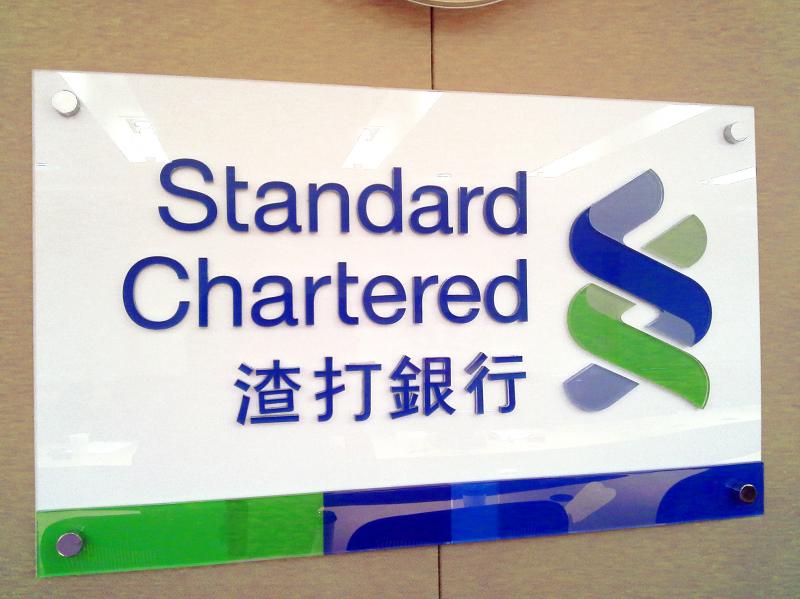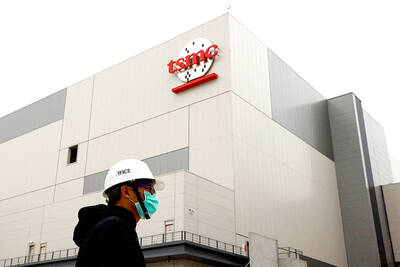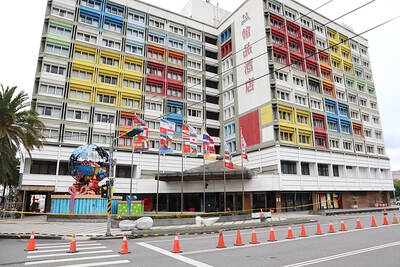The majority of Taiwanese companies are upbeat about business in ASEAN economies and plan to boost their investment there in the next three to five years, Standard Chartered Bank (Taiwan) Ltd (渣打國際商業銀行) said yesterday.
Citing a survey of 44 local companies it conducted in April, the bank said in a report that 95 percent of the firms polled expected revenue to grow in ASEAN member states, with 59 percent predicting growth of 10 to 20 percent over the next 12 months, and 14 percent expecting growth of more than 20 percent.
Ninety-three percent expected their annual production in ASEAN members to increase, while 91 percent said they planned to increase their investment by at least 25 percent in the next three to five years once the Regional Comprehensive Economic Partnership (RCEP) takes effect.

Photo: Lee Chin-hui, Taipei Times
The top three incentives for Taiwanese firms to expand operations in ASEAN were access to the region’s large and growing consumer market, reliable suppliers and access to global markets via free-trade agreements signed between ASEAN members and other nations, with 66 percent, 55 percent and 52 percent of respondents saying so respectively.
Fifty percent of Taiwanese firms said they preferred to expand in ASEAN because of support from their governments, while 32 percent wanted to diversify their production footprint and 25 percent were attracted by the availability of a skilled workforce.
Forty-three percent of firms polled said Singapore was the most favorable market, as it offered the best opportunities for expansion because it is a regional logistics hub and has semiconductor manufacturing capabilities.
The Philippines and Malaysia ranked second and third, with support from 39 percent and 34 percent of firms respectively, while 32 percent backed Thailand, 27 percent selected Indonesia and 25 percent picked Vietnam.
“As demand for semiconductors continues to grow in ASEAN, so will exports of such products from Taiwan. In addition, Taiwanese companies [are] keen to set up manufacturing plants in Southeast Asia — a move accelerated by growing geopolitical and trade tensions, ” Standard Chartered said in the report.
With production facilities located in ASEAN, Taiwanese firms could leverage the connectivity and trade links that the RCEP would offer, the bank said, referring to Hon Hai Precision Industry Co’s (鴻海精密) plans to take advantage of the free-trade agreement by bolstering its production capacity in Vietnam with an investment of US$270 million.

Stephen Garrett, a 27-year-old graduate student, always thought he would study in China, but first the country’s restrictive COVID-19 policies made it nearly impossible and now he has other concerns. The cost is one deterrent, but Garrett is more worried about restrictions on academic freedom and the personal risk of being stranded in China. He is not alone. Only about 700 American students are studying at Chinese universities, down from a peak of nearly 25,000 a decade ago, while there are nearly 300,000 Chinese students at US schools. Some young Americans are discouraged from investing their time in China by what they see

Taiwan Semiconductor Manufacturing Co (TSMC, 台積電), the world’s largest contract chipmaker, yesterday reported record sales for the first quarter, which analysts attributed to solid demand for emerging technologies. Consolidated revenue totaled NT$592.64 billion (US$18.51 billion) in the January-to-March period, up 16.5 percent from a year earlier, but down 5.26 percent from the previous quarter, TSMC said in a statement. The first-quarter revenue beat analysts’ average projection of NT$579.5 billion, Bloomberg News reported. That performance lends weight to expectations that the world’s most valuable chipmaker would return to solid growth this year after weathering a post-COVID-19-pandemic cratering of smartphone and computer sales. TSMC is budgeting

HUALIEN BRANCH: The company had been planning to rebuild the hotel before it was damaged in the quake and vowed to give affected employees the option to transfer The owner of Chateau de Chine Hualien (花蓮翰品酒店) is planning to lay off 86 workers after shutting down the hotel due to damage it sustained in a powerful earthquake on Wednesday last week, the Ministry of Labor said yesterday. The hotel has submitted a layoff report to the Hualien County Government and expects to let 69 workers go this month and 17 next month, the ministry said. LDC Hotels & Resorts Group (雲朗觀光集團), the owner of Chateau de Chine Hualien, confirmed the layoff plan in a statement yesterday. LDC said the hotel has been closed since Wednesday last week when the temblor occurred

US CONSCULTANT: The US Department of Commerce’s Ursula Burns is a rarely seen US government consultant to be put forward to sit on the board, nominated as an independent director Taiwan Semiconductor Manufacturing Co (TSMC, 台積電), the world’s largest contract chipmaker, yesterday nominated 10 candidates for its new board of directors, including Ursula Burns from the US Department of Commerce. It is rare that TSMC has nominated a US government consultant to sit on its board. Burns was nominated as one of seven independent directors. She is vice chair of the department’s Advisory Council on Supply Chain Competitiveness. Burns is to stand for election at TSMC’s annual shareholders’ meeting on June 4 along with the rest of the candidates. TSMC chairman Mark Liu (劉德音) was not on the list after in December last